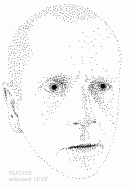Édouard Levé: Suicide
I first came across Édouard Levé this spring when The Paris Review published the surprisingly good "When I Look at a Strawberry I Think of a Tongue," an excerpt from Levé’s as-yet untranslated book Autoportrait. It’s not a story but not quite an essay. It’s personal and confessional but still gives the buzz of great fiction. It also contains one of the most startling sentences I’ve read in a while:
with a friend at whose place we drank cocktails that we made by mixing up his mother’s liquor at random, we would talk until sunrise in the salon of that big house where Mallarmé had once been a guest, in the course of those nights, I delivered speeches on love, politics, God, and death of which I retain not one word, even though I came up with some of them doubled over in laughter, years later, this friend told his wife that he had left something in the house just as they were leaving to play tennis, he went down to the basement and put a bullet in his head with the gun he had left there beforehand.
In the next line the friend and his suicide are dropped, as if the author could only stand to look for this brief moment. Or maybe he’d never meant to say it at all, but the sentence and its unwieldy run-on length had slipped his grasp and turned on him.
Suicide, translated from French by Jan Steyn and released by Dalkey Archive earlier this year, is a novel based on the death of this friend. (Levé himself committed suicide ten days after turning this manuscript in to his editors.) It is a short novel, told in a muted second person. There is a distance and a flatness to the prose. The second person is tolerable because it is not directed at the reader but the dead friend, creating the sense of an accidentally overheard conversation (one-sided of course, as the dead are notoriously bad at answering questions). Much of the book is spent alternating between the friend’s thoughts and working through moments from his life—a homeless man sitting next to him on the metro, an afternoon spent wandering through Bordeaux. These scenes have a dreamy, opaque quality. They function as discrete units, repelling each other, refusing to build as the novel progresses.
Suicide will frustrate some. Not because the writing is difficult or boring—in fact, the opposite. Levé has a light touch and a talent for creating drama in the movement and accumulation of sentences. It will frustrate because there is no catharsis, no moment of connection across the divide. The narrator refuses to believe he understands his friend: "You are like the actor who, at the end of the play, with a final word, reveals that he is a different character than the one he appeared to be playing." As a result, Suicide is less the portrait of a young man and his final act than the performance of the narrator’s mind circling the unknowable.
 Édouard Levé
Édouard Levé